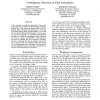Free Online Productivity Tools
i2Speak
i2Symbol
i2OCR
iTex2Img
iWeb2Print
iWeb2Shot
i2Type
iPdf2Split
iPdf2Merge
i2Bopomofo
i2Arabic
i2Style
i2Image
i2PDF
iLatex2Rtf
Sci2ools
114
click to vote
ECP
1997
Springer
1997
Springer
Contingency Selection in Plan Generation
Akey question in conditional planning is: howmany, and whichof the possible executionfailures shouldbe plannedfor? Onecannot, in general, plan for all the possiblefailures becausethe searchspaceis too large. Onecannotignoreall the possible failures, or onewill fail to producesufficiently flexibleplans. In this paper, wedescribe an approachto conditional planning that attempts to identify the contingenciesthat contribute the mostto a plan’s overall utility. Plan generation proceeds by handling the most important contingencies first, extendingthe plan to include actions that will be taken in case the contingencyfails. Wediscuss the representational issues that mustbe addressedin order to implementsuch an algorithm, and present an examplewhichillustrates our approach.
Conditional Planning | ECP 1997 | ECP 1999 | Executionfailures Shouldbe Plannedfor | Possiblefailures Becausethe Searchspaceis |
Related Content
| Added | 07 Aug 2010 |
| Updated | 07 Aug 2010 |
| Type | Conference |
| Year | 1997 |
| Where | ECP |
| Authors | Nilufer Onder, Martha E. Pollack |
Comments (0)

